In the News | Older
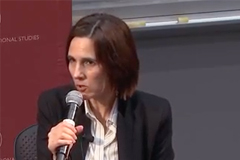 |
In the NewsMarch 22, 2017Mexico’s energy reformMary PottsMIT NewsLourdes Melgar, the Center’s Robert Wilhelm Fellow, MIT alumna, and former Mexican government official discusses opportunities and challenges of recent energy reforms in Mexico. |
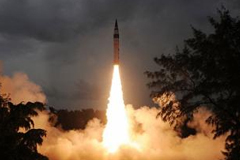 |
In the NewsMarch 21, 2017India may abandon its 'no first use' nuclear policyThe Economic Times"Serious voices, who cannot be ignored, seem to suggest that this is where India may be heading, and certainly wants to head,” said Vipin Narang, an expert on South Asian nuclear strategy. |
 |
In the NewsMarch 20, 2017As trash avalanche toll rises in Ethiopia, survivors ask whyHadra Ahmed and Jacey FortinThe New York TimesThe disaster is at odds with the image Ethiopia wants to project as a rapidly developing country, reports Hadra Ahmed and Jacey Fortin for the New York Times. Fortin is the 2016-17 Elizabeth Neuffer Fellow at CIS. |
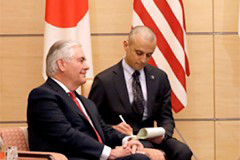 |
In the NewsMarch 16, 2017Rex Tillerson, in Japan, says US needs ‘different approach’ to North KoreaMotoko RichThe New York Times“It’s pretty clear that there’s a perfect storm brewing for mischief in East Asia right now,” said Richard Samuels, Ford International Professor of Political Science and director of the Center for International Studies at MIT. |
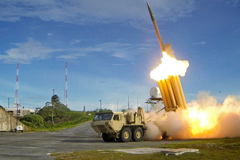 |
In the NewsMarch 11, 2017Why US antimissile system in South Korea worries ChinaChris BuckleyThe New York Times“China is probably confident in its ability to be able to retaliate, but given the size and sophistication of US nuclear forces and the steady development of ballistic missile defenses, coupled with China’s small nuclear arsenal, the margin for error is thin,” said Taylor Fravel and Fiona Cunningham. |
 |
In the NewsMarch 8, 2017CIA scrambles to contain damage from WikiLeaks documentsMatthew Rosenberg, Scott Shane, and Adam GoldmanThe New York TimesInvestigators say that the leak was the work of a disaffected insider. Joel Brenner, senior research fellow at CIS and formerly the country’s top counterintelligence official, suggests that the intelligence agencies need to assess the advisability of sharing secrets widely inside their walls. |
 |
In the NewsMarch 7, 2017FBI prepares for new hunt for WikiLeaks’ sourceDevlin BarrettThe Washington Post“Anybody who thinks that the Manning and Snowden problems were one-offs is just dead wrong,’’ said Joel Brenner, former head of U.S. counterintelligence at the office of the Director of National Intelligence. Brenner is a senior research fellow at CIS. |
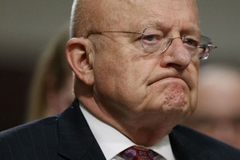 |
In the NewsJanuary 9, 2017Trump's intel bashingJoseph MarksNextgov“When the president of the United States disparages your work, demeans your work, insults the integrity of your work, you wonder why you’re doing it, especially for a government salary,” says Joel Brenner, a senior research fellow at CIS and a former National Security Agency senior counsel. |
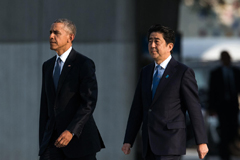 |
In the NewsDecember 9, 2016Japan’s pivot from Obama to TrumpJoshua HuntThe New YorkerAbe’s visit to Trump Tower in November went against the wishes of Obama’s White House, according to a Japanese media report, which cited an unnamed diplomatic source. But Richard Samuels, Ford International Professor of Political Science and director of CIS, says that Abe’s team “did what they had to do, quickly and well.” |
 |
In the NewsDecember 7, 2016How political science helps combat terrorismEmily Hiestand, Kathryn O'NeillSHASS News“As humans, we have all sorts of cognitive biases that come into play when we try to evaluate the risks posed by terrorism as well as the trade-offs of various counterterrorism policies,” says Richard Nielsen, assistant professor of political science. |
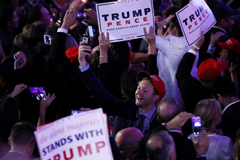 |
In the NewsNovember 9, 2016Donald Trump’s victory is part of a global white backlashZack BeauchampVoxRoger Petersen has argued, persuasively, that ethnic conflict around the world is often driven by something he calls “resentment”: the feeling of injustice on the part of a privileged portion of society. |
 |
In the NewsNovember 8, 2016Businessman Trump or bureaucrat Hillary—Whom does Asia prefer?Wesley RahnDeutsche Welle“The longing for closer association with the West is real,” Richard Samuels, director of CIS and Ford International Professor of Political Science, told Deutsche Welle. “However, it is constrained by the economic forces and opportunities that have only expanded since Clinton made that statement five years ago.” |
 |
In the NewsOctober 15, 2016On the Putinization of politicsElizabeth WoodConcern about the possible role of Russian president Vladimir Putin in the American political process has emerged as an issue in the 2016 presidential election. Elizabeth Wood, professor of history, shares insight into this perspective in an effort to help inform the American voter. |
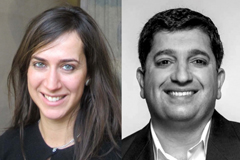 |
In the NewsOctober 14, 2016Collaborating with peers across disciplinesStory prepared by MIT SHASS Communications; Editorial and Design Director: Emily Hiestand; Writer: Leda Zimmerman MIT NewsFotini Christia, associate professor of political science, and Ali Jadbabaie, JR East Professor of Engineering, discuss their research on the dynamics of sociopolitical change. They also share about the MIT Institute for Data, Systems, and Society and how it brought them together. |
 |
In the NewsOctober 13, 2016The US defense budget: Too big, too small or just right?Michelle NewbyThe National Interest“Everything starts with strategy in this business,” answers Barry Posen, Ford International Professor of Political Science and director of the MIT Security Studies Program, as to whether the US defense budget is the appropriate size. “If you accept the present grand strategy it might be true that the defense budget is actually too small.” |
 |
In the NewsOctober 12, 2016Immigration and terrorismJohn TirmanNegative attitudes toward immigrants have many roots. But several studies demonstrate that immigrants of all kinds boost the US economy overall and hurt few if any native-born Americans. So, what really mobilizes anti-immigrant attitudes? John Tirman, CIS executive director and principal research scientist, explains. |
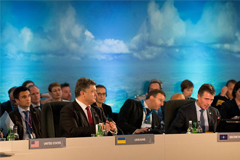 |
In the NewsAugust 22, 2016NATO has problems, but Trump won’t fix themSimon WaxmanBoston ReviewFor Barry Posen, NATO and other permanent alliances are not just a financial drain; they also arguably make Americans less safe, writes Simon Waxman in the Boston Review. Posen refers to such security subsidies as “welfare for the rich.” |
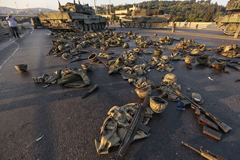 |
In the NewsJuly 18, 2016From Turkey to Nice, looking at safety and stability around the globeHere & NowHere & Now's Meghna Chakrabarti speaks with security analyst Jim Walsh about what instability in that country could mean for the rest of the world, as well as what we’re learning about the recent terrorist attack in Nice, France. |
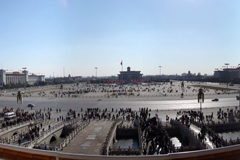 |
In the NewsJune 6, 2016Mass atrocity Monday, 6/6/2016: Tiananmen SquareKate Cronin-FurmanJustice in ConflictSaturday was the anniversary of the suppression by the Chinese military of mass protests at Tiananmen Square in 1989. Twenty-seven years later, the death toll is still unknown. Beijing’s official estimate puts the figure at 241, but credible reports suggest that over 1,000 people may have been killed. |
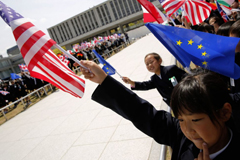 |
In the NewsMay 13, 2016Obama's visit To Hiroshima is 'about memory, more than it's about apology'Meghna ChakrabartiHere & NowHere & Now's Meghna Chakrabarti talks to Richard Samuels, director of the Center for International Studies at the Massachusetts Institute of Technology and founding director of the MIT Japan Program, about the significance of Obama's visit, and Japan's evolving attitudes toward militarization. |


